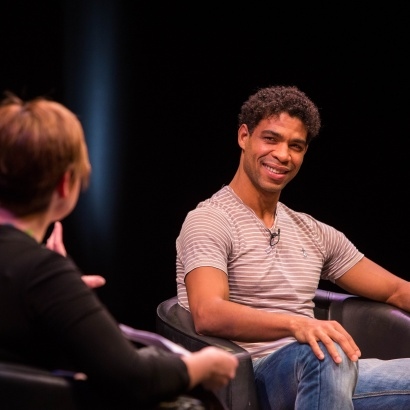 Chapter & Verse Blog
Chapter & Verse Blog
The Manchester Literature Festival Blog
Review: Carlos Acosta at The Lowry
There was an audible collective swoon as Carlos Acosta emerged from the wings of the Lowry’s Quay Theatre. It’s no exaggeration to say he is one of the most recognisable dancers in the history of ballet, famed for his jaw-dropping strength, spirited musicality and undeniable charisma.
But rather than launching himself across the stage into an impressive balletic display, today he took a seat with Mariana Casale O’Ryan to chat about his highly anticipated debut novel, Pig’s Foot.
Acosta is no stranger to the world of publishing: his autobiography No Way Home was the subject of both critical acclaim and popular success. But the dancer has taken his literary ambitions further with his latest offering, a novel steeped in the rich and complex history of his Cuban homeland.
The novel’s narrator and protagonist is Oscar Kortico, a young boy growing up in a fictional hamlet called Pig’s Foot, or Pata de Puerco, a name which Acosta admits loses its verve in English. Indeed, the dancer turned novelist began by talking about the wider issues that crop up during the process of translation (the book was translated into English by Frank Wynne.)
Ambitious in scope, Pig’s Foot sweeps through the huge political and social shifts brought about by slavery, revolution and dictatorship. It is against this intriguingly turbulent backdrop that Acosta places a variety of characters, their lives told through family ties and friendships. Mr Bacardi (of the rum empire) even wanders into the novel, which, judging from the extracts that were read during the event, seem to conjure the unique feeling of the country Acosta remembers from his childhood, but which has altered dramatically since.
Despite its ambition, Acosta was quick to point out that the novel does not aspire to break the boundaries of literary form, or attempt to ascend to the heights of Gabriel Garcia Marquez (with whom there will be inevitable comparisons). Rather, his aim was to write ‘an old-fashioned story’. He also spoke enthusiastically about the escapism that writing provides, his literary life presenting a mental space quite apart from the physicality of telling stories through performance and choreography.
Acosta also took questions from the audience, and when asked what he missed most about Cuba, he spoke of the sense of community that he recalled so vividly: the dinners that lasted long into the night, the immediacy of conversation with loved ones. He expressed his concern that technology is altering our perception of community, so that it is now only experienced virtually. Pig’s Foot is built on this nostalgia, harking back to a time where we not only knew our neighbours, but sat down to eat with them regularly.
‘This is what it’s all about’, he said, gesturing between himself and the audience. ‘I want to take you all out for coffee!’ With that smile, Carlos, I’m sure every member of the audience would willingly oblige.
About the writer: Claire Ramtuhul is a writer and arts journalist. She blogs at The Culture Cavern.


